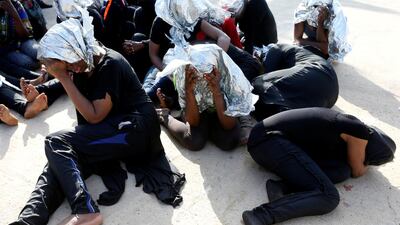Italy’s interior minister said on Wednesday that extremist groups have used recent upheaval in Libya to infiltrate migrant boats heading for the country’s ports.
Matteo Salvini, leader of the anti-immigrant League party, said his country would refuse to allow the vessels to dock.
“Islamic terrorist infiltration is no longer a risk, it has become a certainty: it is therefore my duty to reiterate that no docking will be allowed on Italian shores” Mr Salvini said in a radio interview.
The potential threat of hardened ideologues crossing the Mediterranean has risen in the wake of the flight of an estimated 20,000 people from the capital Tripoli as the city faces Field Marshal Khalifa Haftar’s advance on the capital.
The advance was launched nearly two weeks ago and the United Nations said on Wednesday the conflict was intensifying.
“Some of the most vulnerable people are migrants caught up in semi-detention camps, some of whom are close to the fighting,” the UN Under-Secretary-General for Humanitarian Affairs Mark Lowcock said at a think tank event in London.
“We are doing what we can. What is needed is a scale back in the fighting and better humanitarian access.”
At the UN, a member of the Security Council told The National that there had been no progress on finalising the text of the proposed resolution following Field Marshal Haftar's offensive, chiefly because of Russian objections.
“They don't want any reference to any party to be made in the resolution,” the diplomat said on condition of anonymity.
Asked by reporters in New York to explain his country's position, Dmitry Polyanskiy, Russia's deputy permanent representative to the UN, refused to elaborate.
“I don't know,” he said, when questioned about whether the resolution would go to a vote in the coming days. “It depends not only on us,” he added.
UNHCR, the UN’s refugee agency, has relocated 150 refugees being held at the Abu Selim detention centre in southern Tripoli to protect them from the ongoing clashes.
Shelling in the densely-populated district where the centre is located took place overnight on Tuesday, killing at least seven people, mainly women, and wounding 17.
The civilian casualties include three members of the same family, who lost a mother, daughter and granddaughter, the UN said citing medical sources.
Both sides in the conflict blamed the other of the attack, which saw around 10 rockets hit the residential area.
Gen Haftar’s Libyan National Army (LNA), which has taken control of the east and south of the country following the overthrow of dictator Muammar Qaddafi in 2011, said "terrorist militias" were to blame for the rocket fire.
The UN’s special representative for Libya Ghassan Salame condemned the shelling and ordered those responsible to take responsibility for their actions.
“With great sadness, I extend my deepest condolences to the families of the victims and I wish a speedy recovery for those injured. The use of indiscriminate, explosive weapons in civilian areas constitutes a war crime,” Mr Salame said.
“Liability for such actions lies not only with the individuals who committed the indiscriminate attacks, but also potentially with those who ordered them,” he added.
The clashes have sparked fears that thousands more Libyans will risk the dangerous Mediterranean crossing to flee the conflict.
On Tuesday Libya’s prime minister Fayez Al Sarraj said he believed more than 800,000 of his people could flee to Europe if fighting continued.
"What's going to happen with this security breakdown is that 800,000 illegal migrants on Libyan ground will have to leave Libya and will cross the sea towards Europe," he said.
Mr Al Sarraj warned that among the wave of migrants would be criminals and terrorists linked to ISIS.
The LNA launched the offensive earlier this month against the UN-backed Government of National Accord headed by Mr Al Sarraj and other groups in a bid, it claimed, to “defeat the terrorist and criminal militias that control the decision and financial hubs in Libya”.

